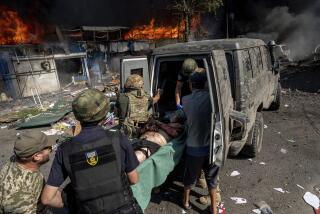Yugoslavia: Carnage Must Stop : Baker is right--it’s time to weigh collective action, presumably by NATO
- Share via
No one knows how many people have died in Bosnia-Herzegovina in the three months since Serbian forces launched a campaign of “ethnic cleansing” in the multicultural republic. Bosnian officials now put the figure at 40,000, while other, perhaps more objective sources put it at a little more than 7,000. What no one disputes is that most of the casualties in this no-quarter conflict are civilians and that the slaughter shows no signs of abating.
Western countries blame Serbia for trying to dominate the remnants of a Yugoslavia now shattered into separate hostile states and, within those states, into warring ethnic factions. Serbs, who constitute about one-third of Bosnia’s population, say they fear discrimination and worse in a Bosnia controlled by its Muslim plurality. They want recognition of their separate status and close links with Serbia.
Both the United Nations and the European Community have put Serbia under sanctions. But the U.N. forces in Bosnia that are trying to reopen the Sarajevo airport so that relief supplies can reach the besieged city have been stymied by well-armed Serbian forces in the surrounding hills.
It is against this background that the Bush Administration is beginning to speak of possible collective military intervention. National Security Adviser Brent Scowcroft now says the Balkan conflict is a security threat to the Western allies. Over the weekend Secretary of State James A. Baker III pointedly noted that “no one has ruled out the possibility of some sort of multilateral (military action)” to break the siege. Baker, like Scowcroft, made clear he wasn’t suggesting unilateral American intervention. The thinking instead is about a collective aerial response, presumably led by NATO members. But Baker also said he thought the sanctions on Serbia should be given more time to work.
There are in fact some signs that the sanctions are beginning to bite. But there are also signs that shortages of food and medicine in Bosnia could soon begin to exact a truly terrible toll. Has the time come for the Western states not just to threaten aerial intervention to save lives in Bosnia but to began planning seriously to carry it out?
More to Read
Sign up for Essential California
The most important California stories and recommendations in your inbox every morning.
You may occasionally receive promotional content from the Los Angeles Times.













